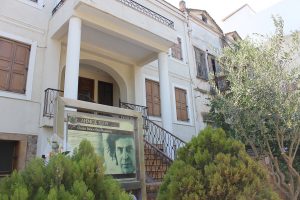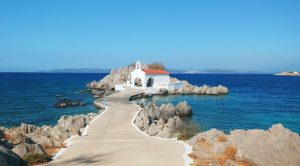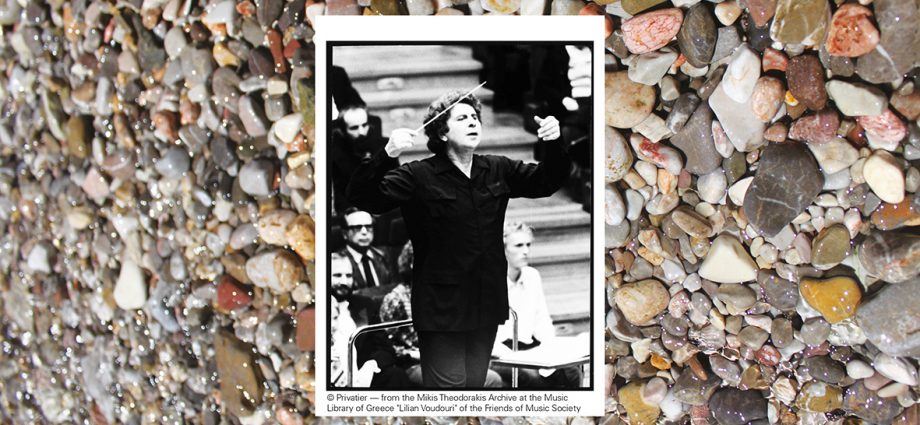Stephanie Merakos, Isabelle Métrope, Thierry Thiébaut, Georges Van Gucht
The Greeks considered him an immortal, given how narrowly he survived imprisonments and ill-treatments and how active he was in the artistic and political life of his country.
Mikis Theodorakis walked alongside his homeland for nearly a century: as part of resistance during the Nazi occupation (1941-44); imprisoned during the Greek civil war (1946-49); part of the opposition during the colonels’ dictatorship (1967-74); then imprisoned again before going into exile in France until 1974. For the former pupil of Olivier Messiaen at the Paris Conservatory, several decades of participation in Greek public life followed: as deputy and even minister (in the government of Konstantinos Mitsotakis, father of the current prime minister) he was an ardent defender of culture and bringing peoples together (Greeks and Turks, among others). For a few years he was the conductor of the choirs and orchestras of the ERT, the Hellenic National Radio and Television.
In 2018, at almost 93 years old and in a wheelchair, he forcefully demanded a referendum on the Macedonian question, speaking to the hundreds of thousands of Athenians gathered in front of Parliament. But the choral world knew Mikis Theodorakis above all thanks to his music: from the masterful work of Canto General, in which he sets the words of Pablo Neruda to music, to his many melodies, based mainly on the texts of Greek or Spanish-speaking authors, through to unforgettable film scores (yes, Zorba the Greek, but also many others!). And operas. And symphony music. And chamber music…
Theodorakis often raised his voice. However, on September 2 he fell silent and his soul flew into the Athenian sky to find his friends Melina Mercouri, Pablo Neruda and many other of the main players of the 20th century. Dear readers, I will tell you a secret: I absolutely wanted to interview Mikis Theodorakis for the ICB. Unfortunately, it is not to be, so let’s give the floor to some of those who worked with him…
Isabelle Métrope, ICB Managing Editor

Parisian creation, February 1981
With my choir “La Brénadienne”, we presented the Canto General in 1981. I met him in Paris at his home, on Rue Notre Dame des Champs, where he lived after being imprisoned at the end of the 1960s by the colonels’ regime. I had called him to ask for advice on the interpretation of his Canto General that I was preparing with my 180 choristers! “Come visit me,” he replied. So, I went. I did not have any bouzoukis to perform his Canto and wanted to know if I could replace them with flutes. We chatted about his music for two hours. A passionate (and fascinating!) man who interluded our discussions with extracts from his compositions by playing them on the piano… On this occasion he showed me a manuscript he had just finished sitting on his desk: Neruda Requiem Aeternam for double choir, keyboards and percussions, a short work of about 15 minutes that he was going to add to the Canto General. I was seized with incredible emotion while listening to the harmonic continuation… Tears flowed… He closed the copy of his manuscript and gave it to me saying, “You will create it with your choir.” We performed this Requiem in February 1981 in the church of Saint Marcel (13th arrondissement pf Paris) in a concert during which we also performed the Petit Messe Solennelle by Rossini.
Thierry Thiébaut, France, A Cœur Joie International President, IFCM Board Member, choir conductor and teacher
With his music and his songs, Mikis Theodorakis will carry on uniting our hearts, opening new worlds for us, as does every great art which converses with its time and its History.
Maria Farantouri, Greek singer and long time musical partner of Mikis Theodorakis
Canto General, August 1975 in Athens, Karaiskakis and Panathinaikos stadiums
Mikis approached us in 1974, with ardour. He wanted a world-renowned ensemble by his side, he knew us very well and admired the rich sound of our instruments. He wanted the Percussions de Strasbourg to be with him for his musical return to Greece.
We started rehearsals and a preview took place in the presence of François Mitterrand at the Salle de la Mutualité in Paris.
In Greece, the rehearsals took place in a friendly and pleasant atmosphere. Mikis had a great sense of humour and so did we… The arrival at the stadium is a moment that we will never forget: we were worried about performing on the pitch and it dulling the sound and the performance. Our doubts were quickly dispelled thanks to the outstanding technicians and highly talented sound engineers. Triumph is a poor word; we were transported by Mikis. His strength, his sensitivity transpires in his strong, dancing, singing conducting. He had an invisible bond with his singers and musicians, nourished by suffering, resentment, courage, and immense joy.
We were overwhelmed by the packed stadium, more than 60,000 people, cheering this symbol of freedom and struggle. The audience was elated by songs of victory. We lived, breathed, and played with soul and conviction, carried by the songs. At the end of the concert there was an unbelievable standing ovation, a frantic pitch invasion towards Mikis.
The Percussions de Strasbourg experienced an unforgettable tour: starting at the Karaiskakis stadium in Piraeus on 13 August, the Patras Stadium on 16 August, back to Athens on 18 August where the double 33 rpm live album was recorded. The last concert was held on 18 August in Thessaloniki. The stadiums were always filled with a huge crowd.
Mikis, the icon. Mikis, the revolutionary. Mikis, the symbol.
Georges Van Gucht, France, Knight of the Order of Arts and Literature, Founder of the Percussions de Strasbourg, Honourary Professor of the Conservatoire National Supérieur de Lyon
Translated by Mirella Biagi, UK/Italy

Mikis Theodorakis: a Greek and universal
I do not know of any Greek that has not sung Theodorakis’ songs in times of love, peace, relaxation, unrest or demonstration. He always provided the right music to move our souls. Α bigger-than-life figure, a musical genius and a genuine symbol for strength, unity, dignity, dedication, and patriotism, Theodorakis led a life passionately devoted to music, Greece, freedom, social justice and world peace. As a musician, activist and intellectual, he has been a unique, internationally recognizable and exuberant persona for almost a century as he indelibly marked, not only music and culture but also history, as an advocate of democracy and peace.
“I had to live this life in order to write these songs,” he said and indeed, his music, that brought high poetry to everybody’s lips, that filled concert halls, stadiums, avenues, and movie theaters, was his means of expressing his state of mind. He created music when he was in love, or in despair, or tried to pull together and guide the people through good and bad times. His purpose was always to unify and calm down political passions. His music is a blessing and an answer to violence. It is a breeze of moving melodies where each note reminds us of his brilliance, his courage, his love for his country and his offering to humanity.
With great emotion and gratitude we say goodbye to “Mikis” of Greece and of the world. His music and spirit accompanied us, inspired us, delighted us and made us better!
Stephanie Merakos, Head of the Music Library of Greece “Lilian Voudouri” of The Friends of Music Society (Athens)

